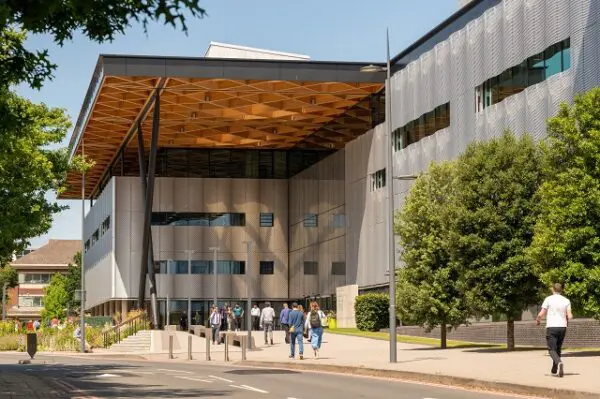
Coventry, United Kingdom
International Relations, Security and Development
When:
12 July - 01 August 2026
Credits:
4 EC
Read more
International Relations Summer Course
When:
18 June - 27 June 2026
School:
Institution:
Global Governance Institute (GGI)
City:
Country:
Language:
English
Credits:
6 EC
Fee:
1800 EUR

Europe and the wider world face complex, multifaceted and fundamental security challenges at an ever-expansive scale. Whether it is ‘new threats’ such as cybersecurity, the impact of environmental degradation on security and livelihoods, the societal impacts of the impending ‘robotics and artificial intelligence revolution’ or the resurgence of ‘classical threats’, such as nuclear proliferation, arms races, regional conflicts, information warfare, hybrid warfare and the challenges of peacekeeping, peacebuilding and conflict resolution, the next generation of students and analysts must be literate in the analytical tools and policy-oriented solutions to a widerange of security problems.
To this end, since 2018, the Global Governance Institute (GGI), the Belgian Royal Military Academy, and a network of senior scholars and policy-makers from international organisations (such as NATO, the European Union and the United Nations) team up every summer to deliver a unique 10-day intensive summer school from the political capital of Europe. This summer school brings together theoretical and policy-oriented perspectives from peace studies, security studies and strategic studies. Students will learn first-hand from some of the leading scholars and senior practitioners about major security challenges and how to apply concrete policy solutions in an integrative manner.
Belgian Royal Military Academy & Global Governance Institute
The 8th GPSSS will take place in Brussels, at the premises of the Global Governance Institute and the Belgian Royal Military Academy.
All learning and social activities are designed and delivered with a focus on engagement and continuous interaction among students, lecturers and invited speakers. The programme provides ample opportunities for exchange and peer learning, exclusive insights from officials and practitioners, and a combination of active learning methods that will ultimately deliver a unique learning experience. Participants will have the chance to experience Brussels and take part in networking activities and thematic visits to European institutions.
The programme is open to undergraduate and graduate students, currently enrolled at a recognised higher education institution or who have recently graduated, as well as practitioners, civil society organisations and NGO workers.
Theoretical perspectives
During the foundation sessions, students will discuss the major theories in the fields of security, peace and strategic studies and will acquire the ability to analyse, assess and evaluate major assumptions behind core paradigms and policy decisions. Sessions on peace, security and strategic studies combined with an introduction to geopolitics will allow students to conduct a thorough analysis of contemporary security issues from a European and Global perspective.
Institutions and major actors
With the help of a variety of lecturers and in-depth expert seminars, students will be given both a critical academic and honest internal perspective on the history, policies and outcomes of the major international organisations present in Brussels that deal with European and global security issues. Students will understand that almost every organisation tries to tackle a large number of security problems but that none of them can deal with all these problems on their own, necessitating comprehensive and integrative approaches.
Major issues and challenges
Once students have understood core theoretical explanations as well as the opportunities andlimitations of the major actors and tools, a variety of interactive lectures, seminars and exercises will be provided to allow students to analsze the main peace, security and strategic challenges that policy-makers face today and will in all likelihood face in the near future. Ranging from ‘traditional’ challenges, such as war and conflict, geopolitical rivalries, terrorism, global economic governance, the summer school will also explore more recent issues, such as cybersecurity, artificial intelligence and the robotics revolution as well as environmental security, the migration-security nexus and the impact of populism and extremism on security.
Forward-thinking and skills training
The summer school will challenge students to not only ask the right questions, but also to collectively think about innovative, yet implementable policy solutions. Senior practitioners and think tank experts will share their insights into their policy work, scenario-building and ‘blue sky’ thinking. Students will also receive training on diplomatic mediation and negotiation, as well as rare insights into the inner workings of international policy-making.
Fee
1800 EUR, The fee covers participation in all sessions, thematic visits, learning materials and a three-month access to the digital learning platform, as well as lunch, coffee and refreshments throughout the programme, a reception, the group dinner, and social activities in Brussels.
When:
18 June - 27 June 2026
School:
Institution:
Global Governance Institute (GGI)
Language:
English
Credits:
6 EC

Coventry, United Kingdom
When:
12 July - 01 August 2026
Credits:
4 EC
Read more

Barcelona, Spain
When:
29 June - 24 July 2026
Credits:
6 EC
Read more

Amsterdam, Netherlands
When:
16 June - 25 June 2026
Credits:
0 EC
Read more